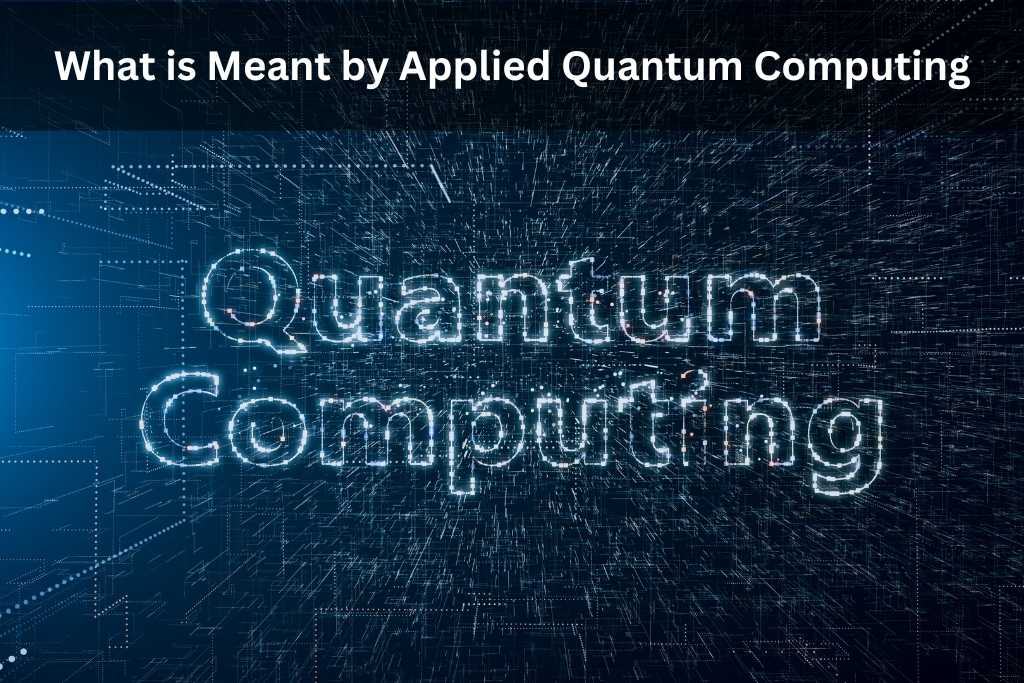What is Meant by Applied Quantum Computing In 2023?

What is Meant by Applied Quantum Computing
Quantum computing, an emerging field of computing, holds the potential to revolutionize the way we process information and solve complex problems.
Unlike classical computers that use bits, quantum computers use qubits, allowing them to process vast amounts of information simultaneously.
This article delves into the world of applied quantum computing, its practical uses, and the potential impact it could have on different industries.
What Is Quantum Mechanics:
To grasp the fundamentals of quantum computing, we need to understand the principles of quantum mechanics.
The foundation of quantum computing lies in qubits, which can exist in various states simultaneously due to the concept of superposition.
Furthermore, entanglement allows qubits to be correlated in such a way that the state of one qubit is directly related to the state of another, even if they are physically separated.
Now we know What is meant by applied quantum computing? Let’s get pumped about what the future holds!
The Difference Between Quantum Computing and Classical Computing:
Classical computers rely on bits, which can either be 0 or 1. In contrast, qubits can represent 0, 1, or any superposition of these states, granting quantum computers remarkable computational power.
This enables quantum computers to perform certain tasks exponentially faster than classical computers, thanks to parallelism and quantum speedup.
Applications of Quantum Computing:
The potential applications of quantum computing are vast and exciting. One crucial area is the solution of complex optimization problems, where quantum algorithms can outperform classical ones significantly.  Additionally, quantum computers excel at simulating quantum systems, enabling researchers to gain insights into molecules and materials that were previously unattainable.
Additionally, quantum computers excel at simulating quantum systems, enabling researchers to gain insights into molecules and materials that were previously unattainable.
Moreover, quantum computing offers the potential to revolutionize data security and cryptography, making current encryption methods obsolete.
Challenges in Quantum Computing:
While quantum computing shows tremendous promise, it also faces several challenges. Decoherence, caused by interactions with the environment, can lead to errors in quantum computations.
Quantum error correction techniques are crucial to address these issues. Additionally, the scalability of quantum computers remains a significant hurdle that researchers are actively working to overcome.
What is Applied Quantum Computing?
Applied quantum computing refers to the practical implementation of quantum computing techniques and algorithms to solve real-world problems.
It goes beyond theoretical research and aims to make tangible advancements that can benefit industries and society as a whole.
Applied quantum computing leverages the unique capabilities of quantum computers to tackle complex challenges that classical computers struggle to solve efficiently.
Recommended Posts:
- How To Fix Pressure Spots On LCD Screen Best Way In 2023
- How to Use Varifocals with Computers Best Way In 2023
Top 10 Applications of Applied Quantum Computing
Quantum computing, with its ability to perform complex calculations at unprecedented speeds, holds immense potential for various industries and fields.
As researchers continue to make progress in this groundbreaking technology, numerous practical applications of applied quantum computing have emerged.
Let’s explore the top 10 areas where quantum computing is making a significant impact:
1. Drug Discovery and Molecular Modeling:
Quantum computing has the potential to revolutionize drug discovery and molecular modelling. Quantum simulations can accurately model the behaviour of complex molecules, leading to the identification of new drug candidates and a deeper understanding of biochemical interactions.
Quantum simulations can accurately model the behaviour of complex molecules, leading to the identification of new drug candidates and a deeper understanding of biochemical interactions.
This could significantly accelerate drug development and lead to more effective treatments for various diseases.
2. Machine Learning and AI:
Quantum machine learning is an emerging field that harnesses the power of quantum algorithms to enhance various AI tasks.
Quantum computers can process and analyze massive datasets more efficiently, leading to improved pattern recognition, classification, and optimization.
Quantum machine learning has the potential to unlock new possibilities in artificial intelligence and data analytics.
3. Financial Modeling and Risk Analysis:
In the finance industry, applied quantum computing can be used for financial modelling and risk analysis.
Quantum algorithms can quickly analyze complex financial data and assess risk factors, enabling better investment strategies and more accurate predictions in unpredictable markets.
4. Cryptography and Data Security:
Quantum computing’s potential impact on cryptography is both a blessing and a challenge. 
While quantum computers can break traditional encryption methods, they can also be harnessed to create quantum-resistant cryptographic techniques.
Quantum cryptography offers the promise of secure communication channels and data protection against quantum attacks.
5. Supply Chain Optimization:
Optimizing supply chains involves juggling numerous variables and considerations.
Quantum computing can analyze vast amounts of data and factors simultaneously, leading to more efficient and cost-effective supply chain management.
This could result in reduced transportation costs, better inventory management, and improved overall supply chain performance.
6. Weather Forecasting and Climate Modeling:
Weather forecasting and climate modelling require immense computational power to process complex atmospheric data.
Quantum computing’s ability to perform parallel calculations can significantly enhance weather simulations, leading to more accurate forecasts and better understanding of climate patterns.
7. Protein Folding and Drug Design:
Understanding protein folding is crucial for drug design and developing treatments for various diseases.
Quantum computing can simulate protein folding dynamics more accurately, leading to the discovery of novel therapeutic targets and the design of more effective drugs.
8. Traffic Optimization and Urban Planning:
Urban areas face challenges in traffic optimization and urban planning. Quantum computing can analyze traffic flow patterns, consider various transportation modes, and optimize urban infrastructure more efficiently. This could lead to reduced congestion and improved urban sustainability.
9. Portfolio Optimization in Investment Management:
Investment management often involves optimizing portfolios to achieve desired financial goals while managing risk. Quantum computing can efficiently optimize investment portfolios by considering multiple assets and risk factors simultaneously. This could lead to improved investment strategies and higher returns for investors.
Quantum computing can efficiently optimize investment portfolios by considering multiple assets and risk factors simultaneously. This could lead to improved investment strategies and higher returns for investors.
10. Optimization Problems:
One of the most promising applications of applied quantum computing is in solving optimization problems. Quantum algorithms can efficiently navigate vast solution spaces, making them ideal for optimization challenges in fields like logistics, finance, and operations research.
Quantum computers can find optimal solutions much faster than classical computers, leading to improved efficiency and cost savings.
Recommended Posts:
- How To Fix Pressure Spots On LCD Screen Best Way In 2023
- How to Use Varifocals with Computers Best Way In 2023
Real-World Examples of Applied Quantum Computing:
In recent years, researchers and companies have started exploring the practical applications of quantum computing in various domains.
One promising area is quantum machine learning, where quantum algorithms can accelerate training processes and enhance pattern recognition.
Another exciting application lies in drug discovery and molecular modelling, where quantum computers can simulate the behaviour of molecules and identify potential new drugs more effectively.
Supply chain optimization is another field where applied quantum computing can bring transformative benefits.
By analyzing vast amounts of data and considering multiple variables simultaneously, quantum computers can optimize supply chain logistics, leading to cost reductions and improved efficiency.
The Future of Applied Quantum Computing
As research in quantum computing progresses, so do the practical applications. The future of applied quantum computing looks bright, with advancements that could have a profound impact on various industries.
Integrating quantum and classical computing is likely to become more prevalent, creating hybrid systems that harness the strengths of both approaches.
How to Get Started with Applied Quantum Computing
Getting started with quantum computing might seem intimidating, but there are several steps you can take to dive into this exciting field. Whether you have a background in computer science or are just curious about quantum physics, here’s a beginner’s guide to help you embark on your quantum computing journey:
1. Understand the Basics of Quantum Mechanics
Quantum computing is rooted in the principles of quantum mechanics. To get started, familiarize yourself with concepts like superposition, entanglement, and quantum gates. Online resources, tutorials, and books can provide an introduction to quantum mechanics in a beginner-friendly manner.
2. Learn Quantum Programming Languages
Just like classical computers have programming languages like Python and Java, quantum computers use their languages. Popular quantum programming languages include Qiskit, Cirq, and Quipper. Choose one of these languages and start experimenting with simple quantum programs.
3. Explore Quantum Development Kits
Quantum development kits, such as IBM’s Quantum Experience and Google’s Cirq, provide access to cloud-based quantum computers. These platforms allow you to run your quantum algorithms on real quantum hardware and see the results. Start with small experiments and gradually work your way up to more complex programs.
4. Take Online Quantum Computing Courses
Numerous online platforms offer quantum computing courses for beginners. These courses cover everything from the fundamentals of quantum mechanics to hands-on programming. Some popular platforms include Coursera, edX, and Quantum Computing Playground.
5. Follow Quantum Computing Blogs and News
Stay up-to-date with the latest developments in quantum computing by following blogs, news websites, and social media channels dedicated to the field. This will help you stay informed about breakthroughs, research, and industry trends.
6. Join Quantum Computing Communities
Join online forums, Reddit groups, and social media communities focused on quantum computing. Engaging with like-minded individuals can provide insights, foster discussions, and offer support when you face challenges.
7. Experiment with Quantum Algorithms
Start experimenting with simple quantum algorithms. Begin with algorithms like Deutsch-Josza, Grover’s, or Bernstein-Vazirani. These algorithms are foundational and will give you a taste of how quantum algorithms differ from classical ones.
8. Read Quantum Computing Books
There are several excellent books on quantum computing written for beginners. Some popular titles include “Quantum Computing for Everyone” by Chris Bernhardt and “Quantum Computing: A Gentle Introduction” by Eleanor G. Rieffel and Wolfgang H. Polak.
9. Attend Quantum Computing Webinars and Events
Keep an eye out for webinars and events hosted by quantum computing researchers and companies. These events often offer valuable insights, tutorials, and opportunities to interact with experts.
10. Join Quantum Computing Hackathons and Challenges
Participate in quantum computing hackathons and coding challenges. These events provide hands-on experience, foster creativity, and allow you to collaborate with others in the quantum community.
Remember, quantum computing is a rapidly evolving field, and there’s always something new to learn. Be patient, persistent, and open to exploring the wonders of quantum mechanics and the potential of quantum computing. Happy quantum computing journey!
The Impact of Applied Quantum Computing on Industries
Applied quantum computing has the potential to disrupt several industries. In healthcare and pharmaceuticals, it could revolutionize drug discovery and personalized medicine.
In finance and banking, quantum computing could improve risk assessment and optimize trading strategies.
In logistics and transportation, quantum computing could streamline supply chain operations, reducing costs and environmental impact.
Recommended Posts:
- How To Fix Pressure Spots On LCD Screen Best Way In 2023
- How to Use Varifocals with Computers Best Way In 2023
Ethical Considerations in Applied Quantum Computing
As with any groundbreaking technology, ethical considerations are paramount. Quantum computing raises concerns about data privacy and security, as quantum algorithms may crack current encryption methods.
Ensuring fairness and addressing biases in quantum algorithms is also essential, particularly in domains like machine learning.
Conclusion
Applied quantum computing represents a new era in computing, where the potential for solving complex problems and transforming industries is within reach.
As research progresses and technologies mature, we can expect quantum computing to play an increasingly significant role in various aspects of our lives.
Embracing the opportunities and addressing the challenges responsibly will pave the way for a quantum-powered future.
We appreciate your interest in our article on the topic of “what is meant by applied quantum computing.” Thank you for taking the time to read it. We hope that it was informative and useful for you.
FAQs: What is meant by applied quantum computing?
Q1. Is quantum computing the same as classical computing?
Ans: No, quantum computing and classical computing differ significantly in their underlying principles and computational capabilities.
Q2. What are qubits, and why are they essential in quantum computing?
Ans: Qubits are the basic units of quantum information, and their ability to exist in multiple states simultaneously allows quantum computers to perform complex computations efficiently.
Q3. Can quantum computers break encryption methods?
Ans: The potential of quantum computers to break existing encryption methods emphasizes the necessity for cryptography techniques that are resistant to quantum computing.







